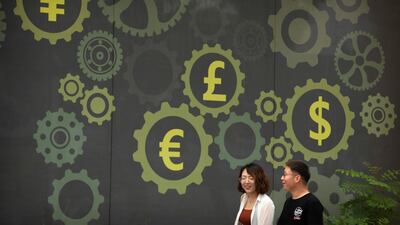Middle East and North African countries must press on with deeper economic reforms to boost employment and growth while liberalising their markets, the World Bank said as it revised down its growth estimates for the region.
The lender, based in Washington, adjusted economic growth in the region down to an average 0.6 per cent this year, a 0.8 percentage point drop from its April forecast.
It said this was a result of voluntary oil production cuts, geopolitical tension and the trade war between the US and China.
In July, the International Monetary Fund cut its growth forecast for the global economy for a fourth time, to 3.2 per cent, because of these factors and Brexit uncertainty.
The Mena region’s “economic outlook is subject to substantial downside risks, most notably intensified global economic headwinds and rising geopolitical tensions", World Bank chief economist Rabah Arezki wrote in the lender's outlook report.
Next week Washington will host the annual IMF World Bank meetings.
Growth in the Mena region is forecast to rise to 2.6 per cent in 2020 and 2.9 per cent in 2021, the World Bank said.
"The growth is a fraction of what is needed to create enough jobs for the fast-growing, working-age population,” Mr Arezki said.
“Even in those few countries that have had periods of higher growth, poverty failed to decline, suggesting a need for reforms to instil fair competition and promote inclusive growth.”
Opec+, the alliance led by Saudi Arabia and Russia, has been cutting back 1.2 million barrels per day (bpd) from the oil markets since the start of January to try to keep the crude inventory overhang in check.
The Opec+ pact, which will be reviewed at a meeting of the producers in Vienna in December, is expected to hold until March next year.
The pact has allowed oil prices to rebound from a three-year slump that began in 2014, with Brent hovering between $55 and the mid-$60s a barrel.
Lower oil prices and a contraction of Iran’s economy, which came under new US sanctions after Washington withdrew from a nuclear agreement between Tehran and world powers in May, underpins the regional forecast revision, the bank said.
Iran’s economy is projected to contract 8.7 per cent this year after shrinking almost 5 per cent last year.
The World Bank echoed the views of the International Energy Agency on tapering demand for oil globally, which would put downward pressure on oil prices.
The steady decline in oil over the past few years “poses fundamental challenges to both the short-term and long-term prospects for Mena oil exporters directly, and indirectly for Mena oil importers because of their economic connections with neighbouring countries", the bank said.
Despite revising down the growth projections of GCC economies to an average 1.1 per cent this year, the bank commended countries for promoting their non-oil economies as part of their diversification agenda.
It pointing to Saudi Arabia’s September Purchasing Managers’ Index, a gauge that gives a single-figure snapshot of operating conditions in the kingdom's non-oil private sector economy.
The index rose to 57.3 in September from 57 in August, the fastest pace in three months, signalling a sustained improvement in growth momentum in the Arab world's biggest economy.
The UAE economy continues to benefit from infrastructure projects related to Expo 2020.
For oil-importing countries such as Lebanon, the bank projects the economy will contract 0.2 per cent in 2019 because of large current account deficits and the size of the public debt.
That figure was $86bn (Dh316bn) as of the end of July.
“The deterioration on Lebanon’s external side is accelerating,” the bank said.
It showed a $5.9bn decline in the difference between foreign assets owned by Lebanese citizens and Lebanese assets owned by foreigners in the first five months of the year.
In North Africa, the bank said Egypt’s economy had turned a page after completion of an IMF programme that led to exchange rate, fiscal and energy reforms in the country.
Egypt’s economy accelerated 5.4 per cent in the first half of the year, compared with 5.2 per cent in the first six months of 2018.
Looking ahead, the World Bank called for the promotion by Mena countries of fair competition, which it said was key for them to complete the transition from administered to market economies.
It called on countries to strengthen competition laws and enforcement agencies, while “corporatising state-owned enterprises”, promoting the private sector and creating a level playing field between them.


